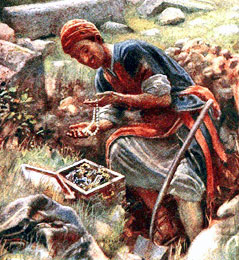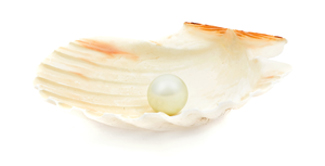July/August
2011 - Vol. 51

The
Treasure and the Pearl
Joyfully
Discovering the Kingdom
..
By Jeanne Kun
[Jesus
said to his disciples:] “The kingdom of heaven is like treasure hidden
in a field, which someone found and hid; then in his joy he goes and sells
all that he has and buys that field.
“Again,
the kingdom of heaven is like a merchant in search of fine pearls; on finding
one pearl of great value, he went and sold all that he had and bought it.”
-
Matthew 13:44-46
Jesus had just
dismissed the crowds after telling them the parable of the weeds and the
wheat. The disciples followed him into a house, asking for an explanation.
He provided one (Matthew 13:36-43) – and then promptly told them
several more parables about the kingdom of God, including this pair about
the hidden treasure and the pearl. Did the disciples see their own experiences
mirrored in these twin parables?

The man who
discovered the buried treasure sold everything he possessed – perhaps a
donkey, his wife’s weaving loom, his family’s house and furniture – to
acquire it.
The merchant,
too, sold all he had to buy the exquisite pearl that far surpassed any
he had ever seen before.
Each man’s
response to his discovery was the same: Recognizing his find to be of inestimable
worth, he sacrificed whatever was necessary to make it his own. The purchasers
didn’t haggle over price. Nor did they bemoan what their acquisitions would
cost them. On the contrary, they made their transactions joyfully, because
what both men stood to gain was so tremendous that it made any monetary
cost, any sacrifice, any leap of faith insignificant in comparison.

Perhaps like
the man who unexpectedly stumbled on the fortune hidden in the ground,
the disciples hadn’t been actively looking for the Messiah. Or they may
have been more like the merchant, seeking something of great intrinsic
worth that would enrich their lives.
No matter whether
they had come upon their treasure inadvertently or had found it after a
long search, the disciples had responded like the men in the parable.

The disciples
had given up everything that previously defined their lives – their livelihoods,
their homes, and their families – to follow an itinerant rabbi who they
believed to be the long-awaited Messiah (Mark 1:16-20).
Following Jesus
required total surrender and commitment (Matthew 16:24-26; Luke 9:23, 14:26-33).
It also required an unwavering faith that the kingdom Jesus was inaugurating
was truly the “pearl of great price.” Through this pair of parables, Jesus
reassured them that, yes, what they had given up could not even begin to
compare with what he would give them in return.
“Truly I tell
you, there is no one who has left house or wife or brothers or parents
or children, for the sake of the kingdom of God, who will not get back
very much more in this age, and in the age to come eternal life” (Luke
18:29-30).
The message
of these brief parables offers encouragement to us as well. It’s not easy
to make a radical investment of ourselves in Christ. It requires an act
of faith to live singleheartedly for him. We may find ourselves at different
stages in our journey – perhaps reluctant to sacrifice certain things in
our lives, perhaps giving up something for a time only to take it back.
But there is
literally everything to gain by persevering. And as we come to joyfully
recognize “the surpassing worth of knowing Christ Jesus” (Philippians 3:8),
we become more like the men in the parables – rushing off to “sell” all
we have for the great treasure of Jesus reigning in our lives.
In
the Spotlight
Wisdom from the
Church Fathers
By
the pearl of price is to be understood the sweetness of the heavenly kingdom,
which, he that has found it, sells all and buys. For he that, as far as
is permitted, has had perfect knowledge of the sweetness of the heavenly
life, readily leaves all things that he has loved on earth; all that once
pleased him among earthly possessions now appears to have lost its beauty,
for the splendor of that precious pearl is alone seen in his mind.
–
St. Gregory the Great, Homilies on the Gospels
Christ
is the treasure which was hid in the field, that is, in this world (for
“the field is the world”); but the treasure hid in the Scriptures is Christ,
since he was pointed out by means of types and parables. . . . It [the
Old Testament law and prophecies] is a treasure, hid indeed in a field,
but brought to light by the cross of Christ.
–
St. Irenaeus, Against Heresies
A
man seeking goodly pearls has found one pearl of great price; that is,
he who is seeking good men with whom he may live profitably, finds one
alone, Christ Jesus, without sin.
–
St. Augustine, Quaest. in Matt.
Excerpted
from Treasures
Uncovered: The Parables of Jesus, by Jeanne Kun (The
Word Among Us Press, © 2005). Used with permission. This
book can be ordered online.
Jeanne
Kun is President of Bethany
Association and a senior woman leader in the Word
of Life Community, Ann Arbor, Michigan, USA. |
| The
pearl of great price and the treasure hidden in a field were a reminder
of the vastness of what is at stake. Compared with that, all other successes
are meaningless; men will make the kingdom their own only if they are willing
to sacrifice everything else for it.
–
Frank Sheed,To Know Christ Jesus
|
In the Spotlight
Pearls Most Precious
With
their beautiful luster and glowing iridescence, pearls were considered
to have far greater value than gold in the ancient world. A fragment of
the oldest known pearl jewelry was found in the sarcophagus of a Persian
princess who died in 520 B.C. Egyptians prized pearls so much that they,
too, were buried with them. In the first century B.C., Julius Caesar decreed
that only rulers of the Roman Empire could wear pearls, the ultimate symbol
of wealth and social stature. Cleopatra reportedly dropped a pearl into
a glass of wine and then drank it, simply to win a wager with Mark Antony
that she could consume the wealth of an entire nation in a single meal.
In A.D. 77, Pliny the Elder observed in his Natural History that
pearls were “the richest merchandise of all, and the most sovereign commodity
throughout the whole world.”
Pearls
are formed in the depths of the sea by oysters, mussels, and mollusks.
Merchants in Jesus’ day went to the Red Sea, the Persian Gulf, and the
Indian Ocean in search of pearls of the highest quality. Unios,
the Latin word used to describe a large, fine pearl, literally means “unique”
or “singular,” since no two of these natural wonders are exactly alike.
Pondering the
Word
1. What might
it have cost the two men – besides money – to possess what they had discovered?
What risks might have been involved in making their purchases?
2. Why do you
think Jesus used hidden treasure and a pearl to describe the kingdom of
heaven? What clues do these parables provide about the nature of God’s
kingdom?
3. Jesus notes
that the man in the field experienced joy even as he prepared to sell all
of his possessions to buy the plot of land. How does this further emphasize
Jesus’ point about the value of the kingdom of heaven? About the value
of worldly things?
4. Jesus told
these parables to his disciples in private, not to the crowds in general
(Matthew 13:36). What does this suggest to you? What light does this shed
on the meaning and cost of discipleship?
5. Matthew’s
gospel places the parables about the treasure and the pearl between Jesus’
explanation of the parable of the weeds among the wheat and a similar parable
about a net thrown into the sea, from which the good fish are separated
from the bad. Why do you think Matthew put the parables in that order?
Grow!
1. Was your
own “discovery” of Christ seemingly accidental and unexpected or the result
of much searching on your part? How did you respond to this discovery?
2. What has
your decision to follow Christ cost you? What part of the “purchase price”
to obtain the treasure did you find most difficult to pay? Are you withholding
any part of the price? If so, why?
3. Which aspect
of the parable speaks to you most personally right now? The joy of discovery?
The value of the kingdom? The total commitment of self to God? Why?
4. In what
ways have you shared the treasure you’ve found in Christ with others? In
what ways could you share that treasure even more?
5. How does
the way you use your resources – your talents, time, money – reflect the
value you place on God’s kingdom?
Reflect!
1. Making Jesus
and the kingdom of heaven our greatest treasure affects the other priorities
and goals in our lives. Consider what adjustments you might need to make
to better reflect the value you place on Jesus and building his kingdom.
2. Reflect
on the following passages to enhance your understanding of the parables
you have just studied:
The
price of wisdom is above pearls. (Job 28:18)
If
you seek [wisdom] like silver,
and search for it as for hidden treasures – then you will understand the
fear of the LORD and find the
knowledge of God. (Proverbs 2:4-5)
Jesus
said to [the rich young man], “If you wish to be perfect, go, sell your
possessions, and give the money to the poor, and you will have treasure
in heaven; then come, follow me.” When the young man heard this word, he
went away grieving, for he had many possessions. (Matthew 19:21-22)
[Jesus]
said to his disciples, “Do not be afraid, little flock, for it is your
Father’s good pleasure to give you the kingdom. Sell your possessions,
and give alms. Make purses for yourselves that do not wear out, an unfailing
treasure in heaven, where no thief comes near and no moth destroys. For
where your treasure is, there your heart will be also.” (Luke 12:32-34)
Yet
whatever gain I had, these I have come to regard as loss because of Christ.
More than that, I regard everything as loss because of the surpassing value
of knowing Christ Jesus my Lord. For his sake I have suffered the loss
of all things, and I regard them as rubbish, in order that I may gain Christ
and be found in him. (Philippians 3:7-9)
Act!
This week share
about the treasure you’ve found in Christ and the joy of this discovery
with at least one person with whom you have never discussed your faith.
In
the Spotlight
Contemporary Voices
The
traditional interpretation sees the farmer and the merchant as disciples
or would-be disciples. But it is possible that both are images of God himself,
who has given what is most precious to him, his own Son (see Matthew 21:37),
to purchase (= redeem) his people. Perhaps it is only when the human person
realizes the extent of God’s extravagance that he can respond with similar
totality.
–
George Montague, SM, Companion God:
A
Cross-Cultural Commentary
on
the Gospel of Matthew
The
gospel parables of the treasure and the pearl of great price, for which
one sells all one’s possessions, are eloquent and effective images of the
radical and unconditional nature of the decision demanded by the kingdom
of God. The radical nature of the decision to follow Jesus is admirably
expressed in his own words: “Whoever would save his life will lose it;
and whoever loses his life for my sake and the gospel’s will save it” (Mark
8:35).
–
Pope John Paul II, The Splendor of Trutth
|